The first half of 2023 has been one of the busiest and most eventful periods the SEO industry has seen for a long time, and this time, itâs not just because of ongoing Google updates like weâve seen in recent years.
The AI revolution and surge of new updates to search, new SEO tools and AI-related product announcements by Google, Bing, OpenAI, and other search engines have created an intense, fast-changing atmosphere for digital marketers.
While itâs still unclear whether Googleâs search results have specifically shifted due to the flood of new AI-generated content, or the testing of new AI products like Search Generative Experience (SGE), it is undoubtedly a volatile moment for organic website visibility. Furthermore, there have been numerous significant, unconfirmed Google updates in recent months.
Below are the domains seeing the greatest losses in SEO visibility on Google.com in the U.S., both in absolute and percentage terms.
The winning domain analysis is also available.
Top 25 Absolute Losers
| # | ï»żDomain | VI - 02 Jan 2023 | VI - 03 July 2023 | VI Change |
|---|---|---|---|---|
| 1 | wikipedia.org | 6397.5696 | 5942.7978 | -454.7718 |
| 2 | youtube.com | 3263.0216 | 2851.5062 | -411.5154 |
| 3 | wiktionary.org | 692.8006 | 355.1692 | -337.6314 |
| 4 | imdb.com | 1021.5559 | 855.9102 | -165.6457 |
| 5 | amazon.com | 3487.7599 | 3336.2896 | -151.4703 |
| 6 | britannica.com | 656.4605 | 507.6614 | -148.7991 |
| 7 | thesaurus.com | 205.4535 | 98.9485 | -106.505 |
| 8 | google.com | 915.0645 | 833.3286 | -81.7359 |
| 9 | merriam-webster.com | 1135.3999 | 1055.585 | -79.8149 |
| 10 | facebook.com | 1020.0894 | 940.3893 | -79.7001 |
| 11 | bedbathandbeyond.com | 89.3603 | 15.8187 | -73.5416 |
| 12 | urbandictionary.com | 130.4188 | 65.4363 | -64.9825 |
| 13 | thefreedictionary.com | 154.5609 | 90.8838 | -63.6771 |
| 14 | dictionary.com | 647.6953 | 584.6909 | -63.0044 |
| 15 | pinterest.com | 469.8782 | 408.7808 | -61.0974 |
| 16 | collinsdictionary.com | 304.3835 | 256.5492 | -47.8343 |
| 17 | apple.com | 351.5402 | 304.2146 | -47.3256 |
| 18 | bestbuy.com | 542.2923 | 500.2972 | -41.9951 |
| 19 | bhphotovideo.com | 148.3322 | 107.1902 | -41.142 |
| 20 | wikivoyage.org | 51.2848 | 12.1112 | -39.1736 |
| 21 | yelp.com | 146.9267 | 109.5745 | -37.3522 |
| 22 | webmd.com | 232.0473 | 199.369 | -32.6783 |
| 23 | ebay.com | 692.0727 | 663.9732 | -28.0995 |
| 24 | fandom.com | 431.6269 | 405.1016 | -26.5253 |
| 25 | mayoclinic.org | 295.7429 | 270.91 | -24.8329 |
Top 25 Percent Losers
| # | ï»żDomain | VI - 02 Jan 2023 | VI - 03 July 2023 | VI Change |
|---|---|---|---|---|
| 1 | bedbathandbeyond.com | 89.3603 | 15.8187 | -82.30% |
| 2 | wikivoyage.org | 51.2848 | 12.1112 | -76.38% |
| 3 | corporatefinanceinstitute.com | 21.1516 | 8.1698 | -61.38% |
| 4 | planetware.com | 20.8866 | 9.8076 | -53.04% |
| 5 | thesaurus.com | 205.4535 | 98.9485 | -51.84% |
| 6 | foursquare.com | 10.404 | 5.0716 | -51.25% |
| 7 | vudu.com | 17.9006 | 8.7633 | -51.04% |
| 8 | self.com | 11.1745 | 5.605 | -49.84% |
| 9 | urbandictionary.com | 130.4188 | 65.4363 | -49.83% |
| 10 | healthgrades.com | 11.3593 | 5.7716 | -49.19% |
| 11 | wunderground.com | 27.0902 | 13.7777 | -49.14% |
| 12 | tvtropes.org | 42.6333 | 21.7961 | -48.88% |
| 13 | sfgate.com | 12.544 | 6.4304 | -48.74% |
| 14 | wiktionary.org | 692.8006 | 355.1692 | -48.73% |
| 15 | sears.com | 25.0327 | 12.8873 | -48.52% |
| 16 | office.com | 17.2054 | 8.9405 | -48.04% |
| 17 | benefits.gov | 9.8643 | 5.4193 | -45.06% |
| 18 | forrent.com | 10.4095 | 5.7874 | -44.40% |
| 19 | dsw.com | 24.7685 | 13.889 | -43.92% |
| 20 | northerntool.com | 8.9276 | 5.0234 | -43.73% |
| 21 | newworldencyclopedia.org | 12.267 | 6.9977 | -42.96% |
| 22 | govinfo.gov | 13.8833 | 7.9414 | -42.80% |
| 23 | travel.gc.ca | 9.0955 | 5.3079 | -41.64% |
| 24 | thefreedictionary.com | 154.5609 | 90.8838 | -41.20% |
| 25 | 10best.com | 11.7292 | 7.07 | -39.72% |
Read the winners report here.
Companies Going Out of Business or Re-branding
The biggest loser in 2023 is bedbathandbeyond.com, whose loss is directly tied to the company filing for bankruptcy and shutting down its site. The company was later acquired by Overstock.com, although itâs unclear whether Overstock has absorbed any of the SEO visibility previously held by bedbathandbeyond.com. Most eCommerce pages appear to serve a 404 response code, as opposed to redirecting to Overstock.
Dictionary Sites
Several prominent dictionary sites were among the biggest losers in the first half of 2023.
Although the declines look relatively small for the 3 dictionary sites in the below chart, these sites carry some of the greatest visibility scores in the U.S. on Google.
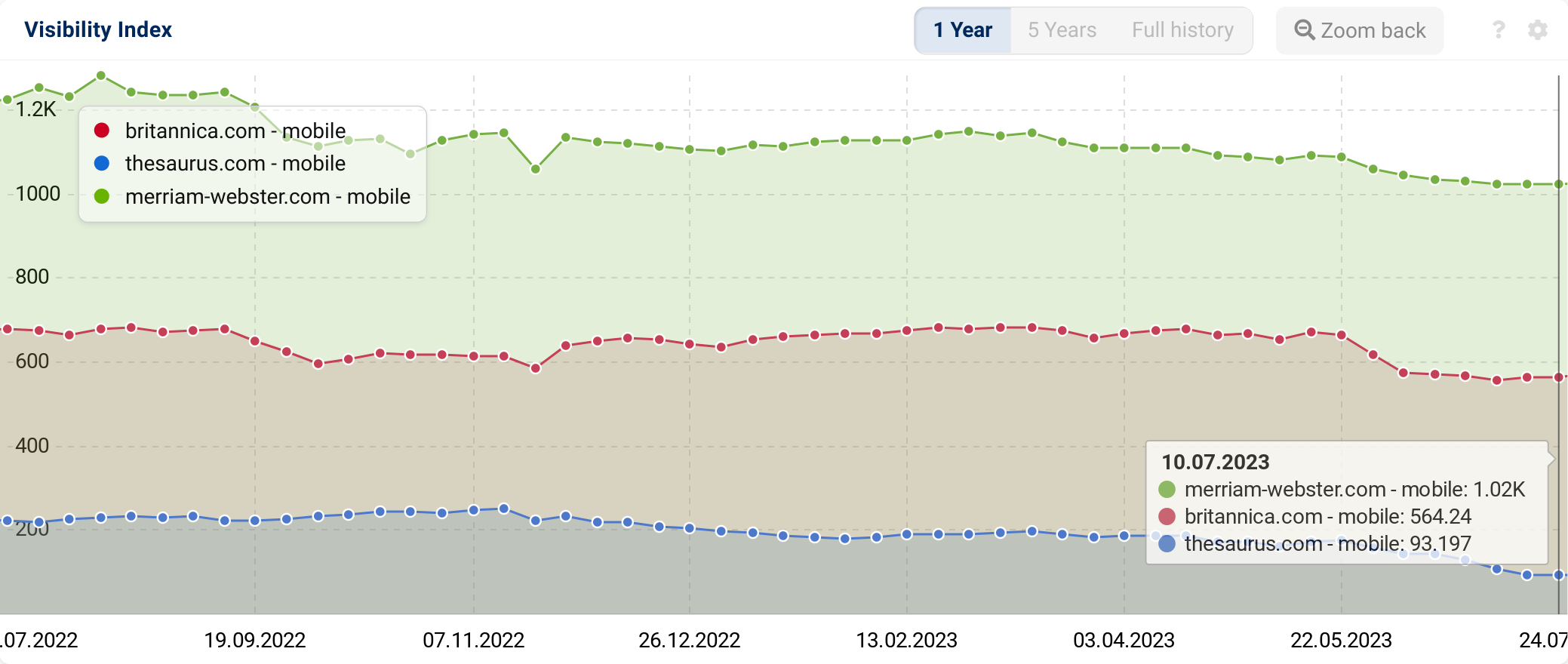
Changes in visibility for dictionary sites are often closely tied to changes in Googleâs understanding of intent. Providing a dictionary definition as the top result is an indication that Google thinks that a definition is the best result for the user, who may need help understanding what the word means.
This is laid out clearly in Googleâs Quality Guidelines, in which Google added this section in its 2019 update:
âWhen assigning Needs Met ratings for dictionary and encyclopedia results, careful attention must be paid to the user intent. Like all results, the helpfulness of dictionary and encyclopedia results depend on the query and user intent.
Dictionary and encyclopedia results may be topically relevant for many searches, but often these results are not helpful for common words that most people in your rating locale already understand. Reserve high Needs Met ratings for dictionary and encyclopedia results when the user intent for the query is likely âwhat is itâ or âwhat does it meanâ and the result is helpful for users seeking that type of information.â
Googleâs algorithms are constantly adjusting to provide the best result for each query. If they have strong enough signals that keywords should return dictionary results – or not – this can significantly impact the visibility of dictionary sites.
The below SERP Comparison chart demonstrates how Britannica lost the #1 position for the keyword âwinter seasonâ between January and June. However, it was not replaced by another dictionary site. Two new articles about winter activities (Good Housekeeping) and winter colds (CNN) moved into the top 5 positions.
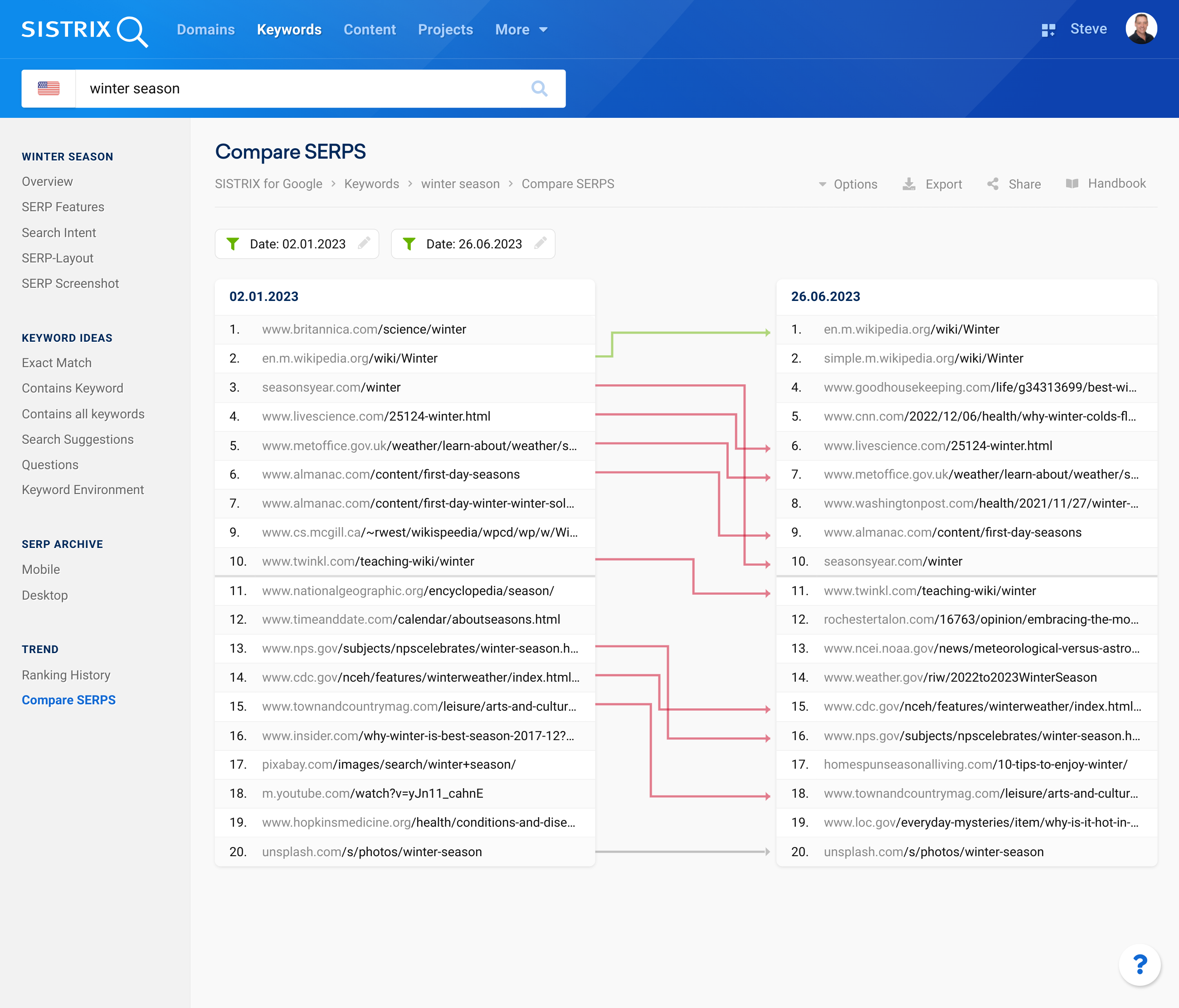
Even Lawinsider.com, which has some dictionary content, saw massive visibility declines specifically in its dictionary subfolder.
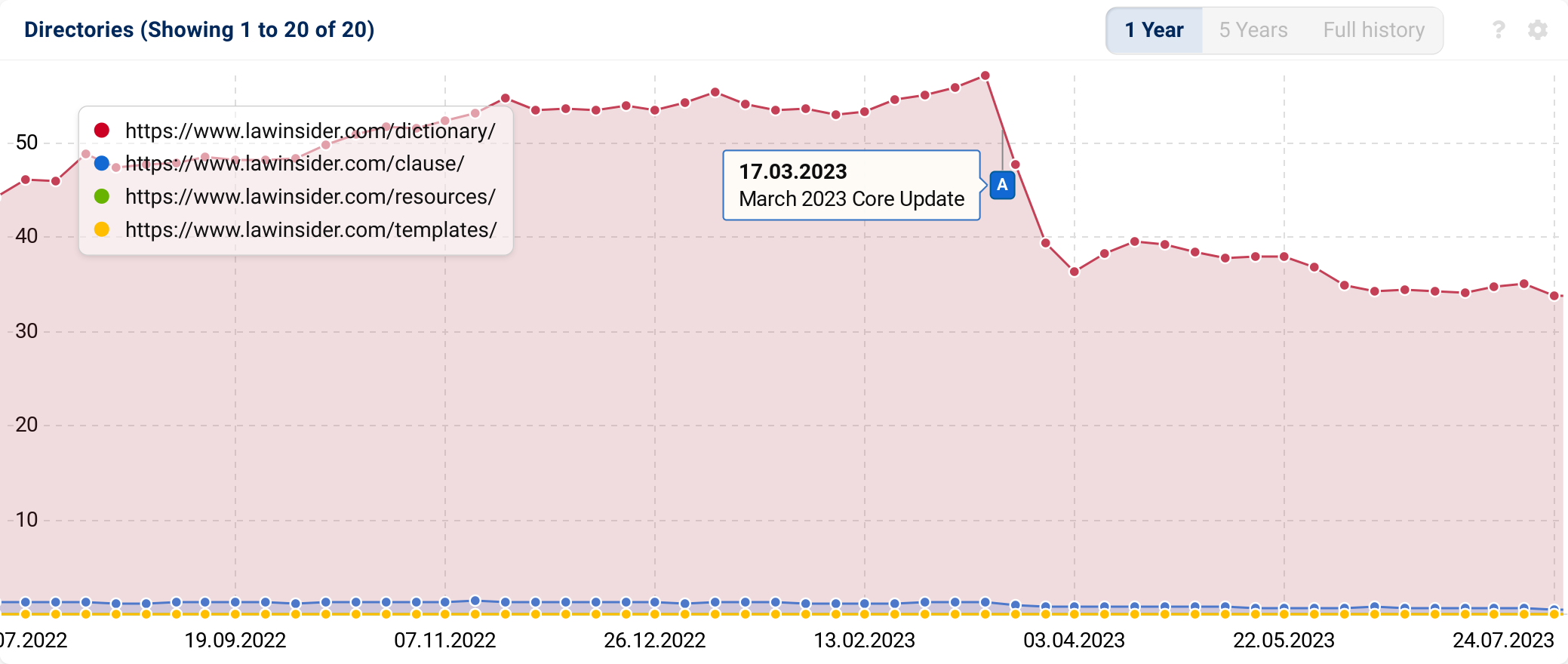
Review Sites (Including Travel Reviews)
Just like 2022, 2023 is shaping up to be a highly volatile year for sites offering reviews. Whereas Googleâs Product Reviews updates of recent years largely affected sites containing product review content, Google expanded its definition this year with the Reviews update.
Reviews now encompass any content that reviews about anything, not just physical products. So this could include movie reviews, travel and destination reviews, and much more.
This may explain the significant losses among several major travel sites, which might not meet the updated criteria Google is looking as part of its Reviews system.
While many factors could explain the overall declines seen by these sites, the Reviews Updates were responsible for at least a portion of their visibility declines:
| Domain | 02.01.2023 | 03.07.2023 | Absolute change | Percent change |
|---|---|---|---|---|
| planetware.com | 20.8866 | 9.8076 | -11.079 | -53% |
| cnet.com | 123.7578 | 113.4639 | -10.2939 | -8% |
| consumerreports.org | 44.4725 | 34.8066 | -9.6659 | -22% |
| rei.com | 51.6645 | 42.8681 | -8.7964 | -17% |
| pcmag.com | 115.6781 | 107.0619 | -8.6162 | -7% |
| techradar.com | 43.2721 | 36.7876 | -6.4845 | -15% |
| thebalancemoney.com | 21.1788 | 14.9545 | -6.2243 | -29% |
| digitalcameraworld.com | 25.0391 | 20.4602 | -4.5789 | -18% |
This even appears to be the case with REI, a behemoth in the SEO space, which saw some declines in its /learn/ folder (which contains product reviews):
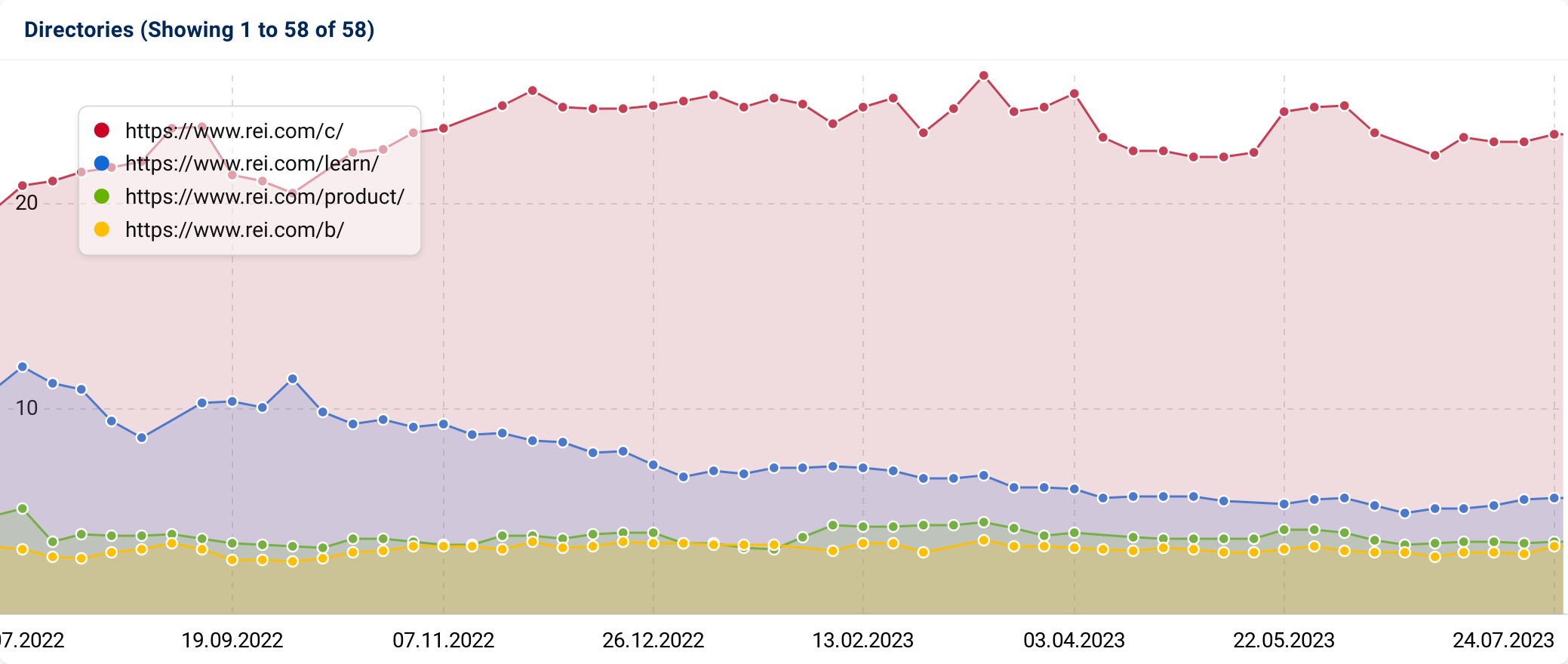
Intent Shifts
While subtle, intent shifts can often explain why certain sites saw increases or decreases in visibility.
If Googleâs algorithms determine that a transactional page is a better result for the query than an informational result – or vice versa – this can explain why rankings shift around. Much of this has to do with Googleâs algorithmsâ ability to detect whether or not a page best suits user intent, and if not, what type of page does it better.
For example, bhphoto.com, which lost 41 visibility points, in many cases only lost 1 or 2 positions for high-volume keywords, but there is a clear intent shift:
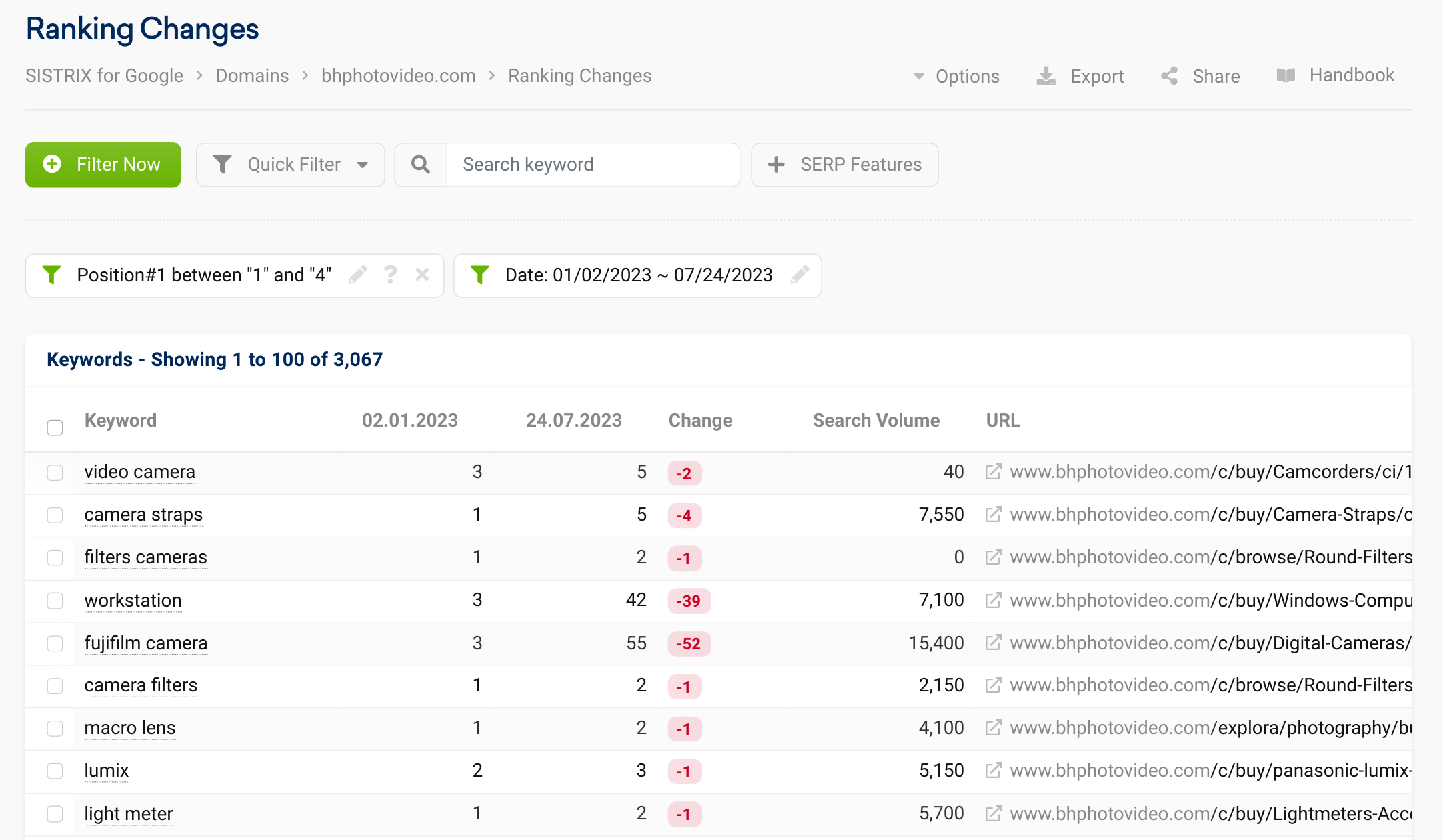
Drilling down into individual keyword changes reveals how intent shifts might occur, when Google thinks an informational or review page is a better result for the keyword than the transactional ecommerce page.
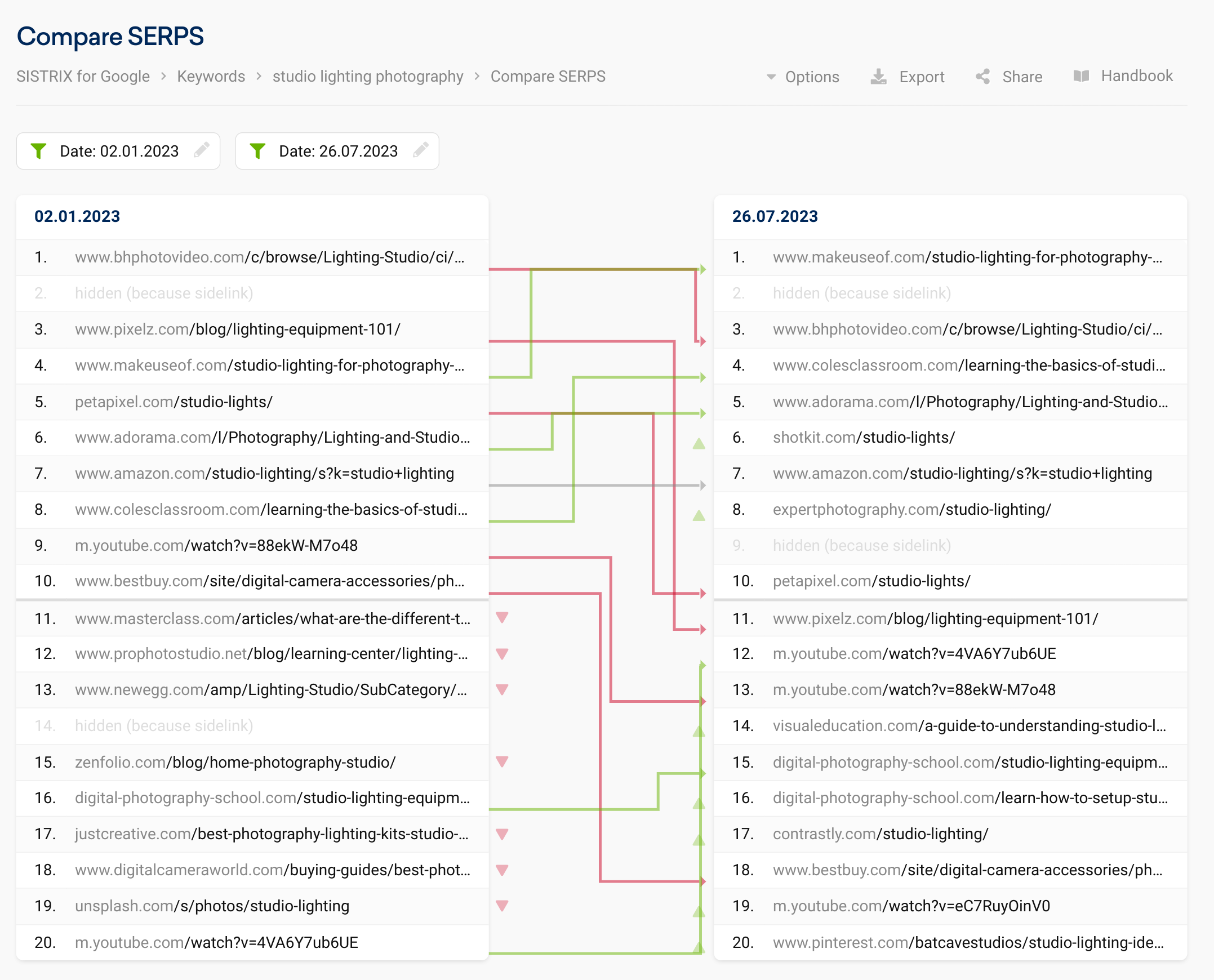
In the example of âstudio lighting photography,â the site Make Use Of earned the #1 position with its article about studio lighting photography for beginners, which replaced BH Photoâs ecommerce page.
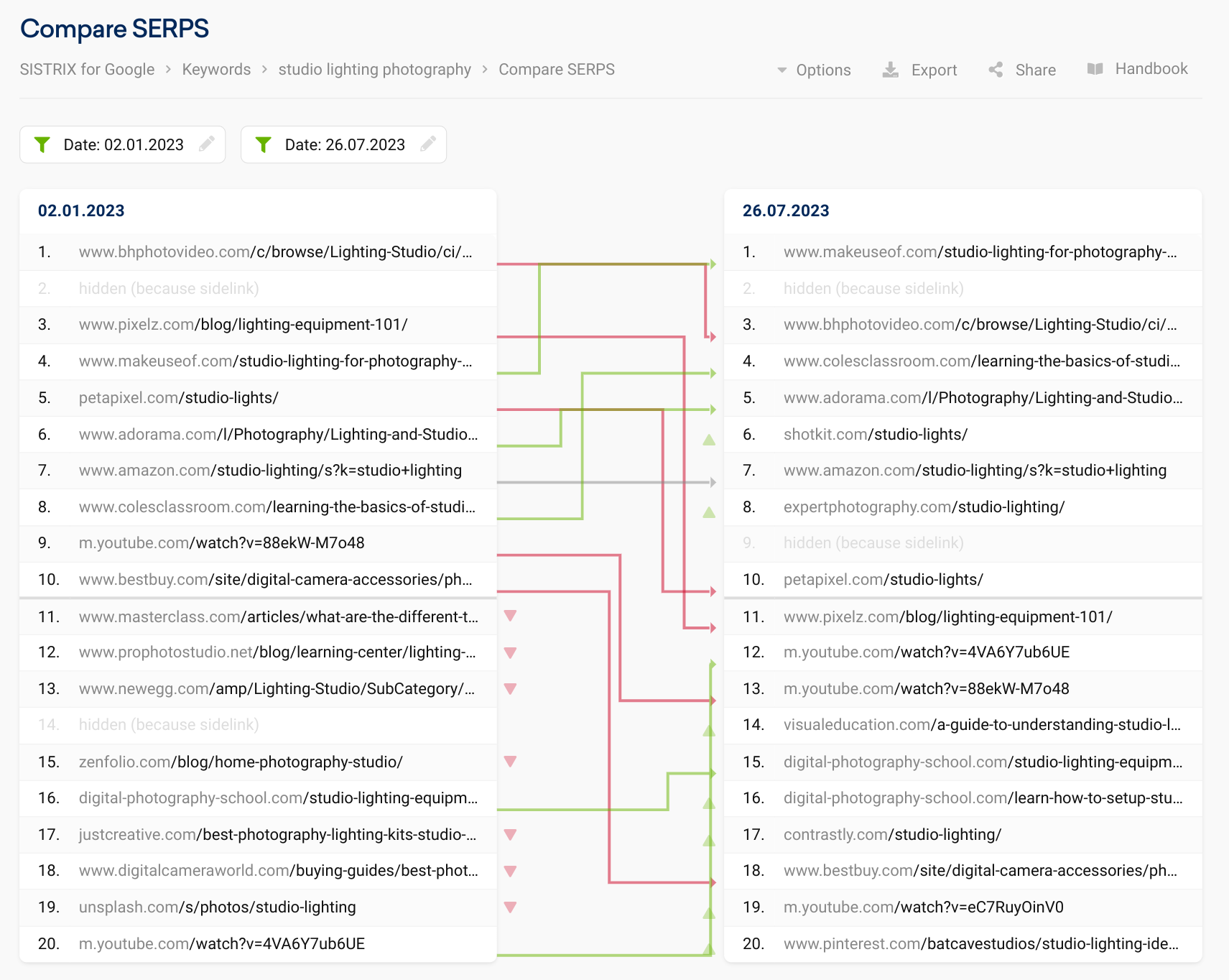
This SERP Comparison report shows the same situation – B&Hâs ecommerce page was outranked by Music Radarâs review article about the best professional headphones.
Visibility Shifting to Other SERP Features?
When sites lose significant visibility points, itâs important to remember how the Visibility Index is calculated in the first place. If pages that previously took up positions in the â10 blue linksâ have now shifted to other features or locations in Googleâs organic results, this could appear as a visibility decline, but really just indicate a shift to somewhere else.
Google launched Perspectives as part of its GoogleIO keynote, in order to display various perspectives about a given topic as a dedicated filter within the organic results, which could account for the 16 visibility points lost by Quora.
Similarly, YouTube, which lost over 411 visibility points, has been ubiquitous in various other SERP features like video results, Google Discover, Perspectives, the Video tab, and more.
So, a loss in visibility points is not always indicative of an actual decline in organic visibility.
Local Store Directory Sites
Several sites that provide local business information and reviews, such as Foursquare, Yelp, and Mapquest all saw significant declines in the first half of 2023.
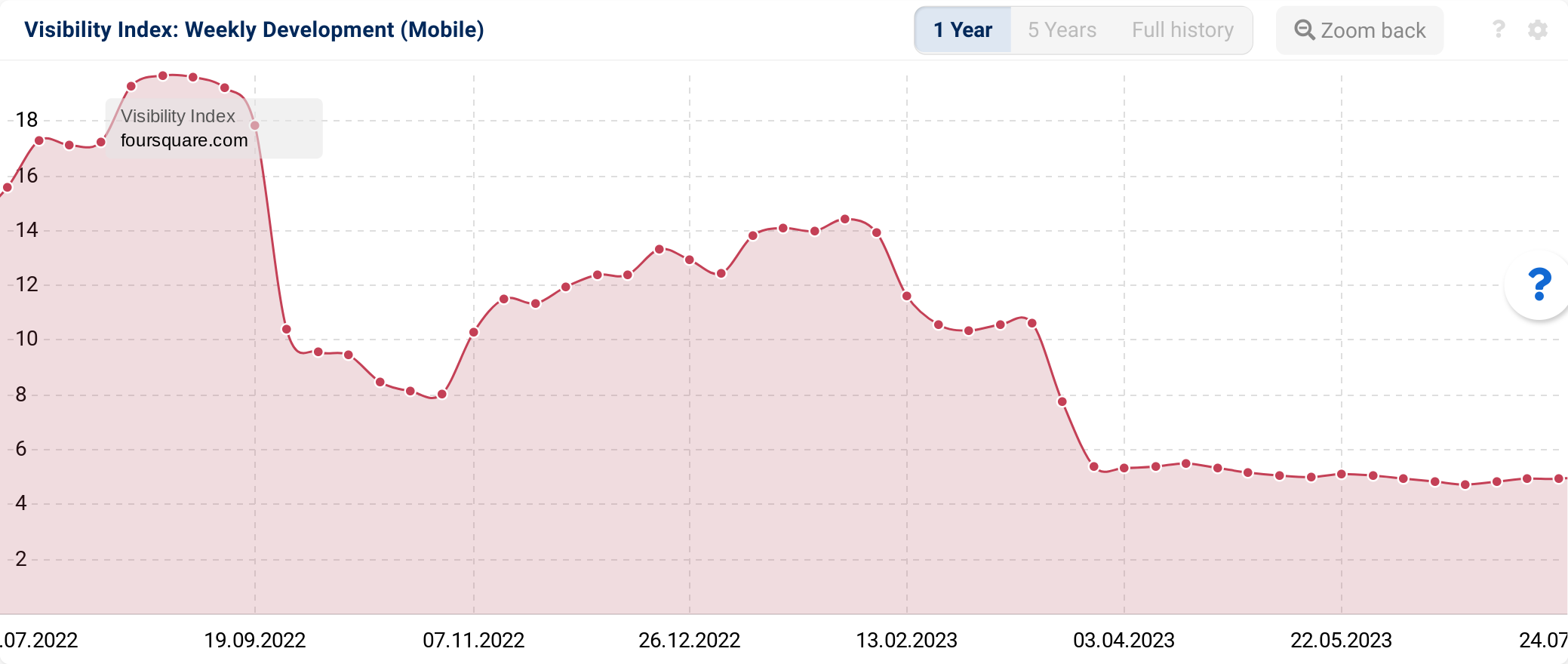
Losses at the Foursquare domain were centered in the /v directory, where the location-focused URLs are hosted. Some heavy keyword rankings were lost.
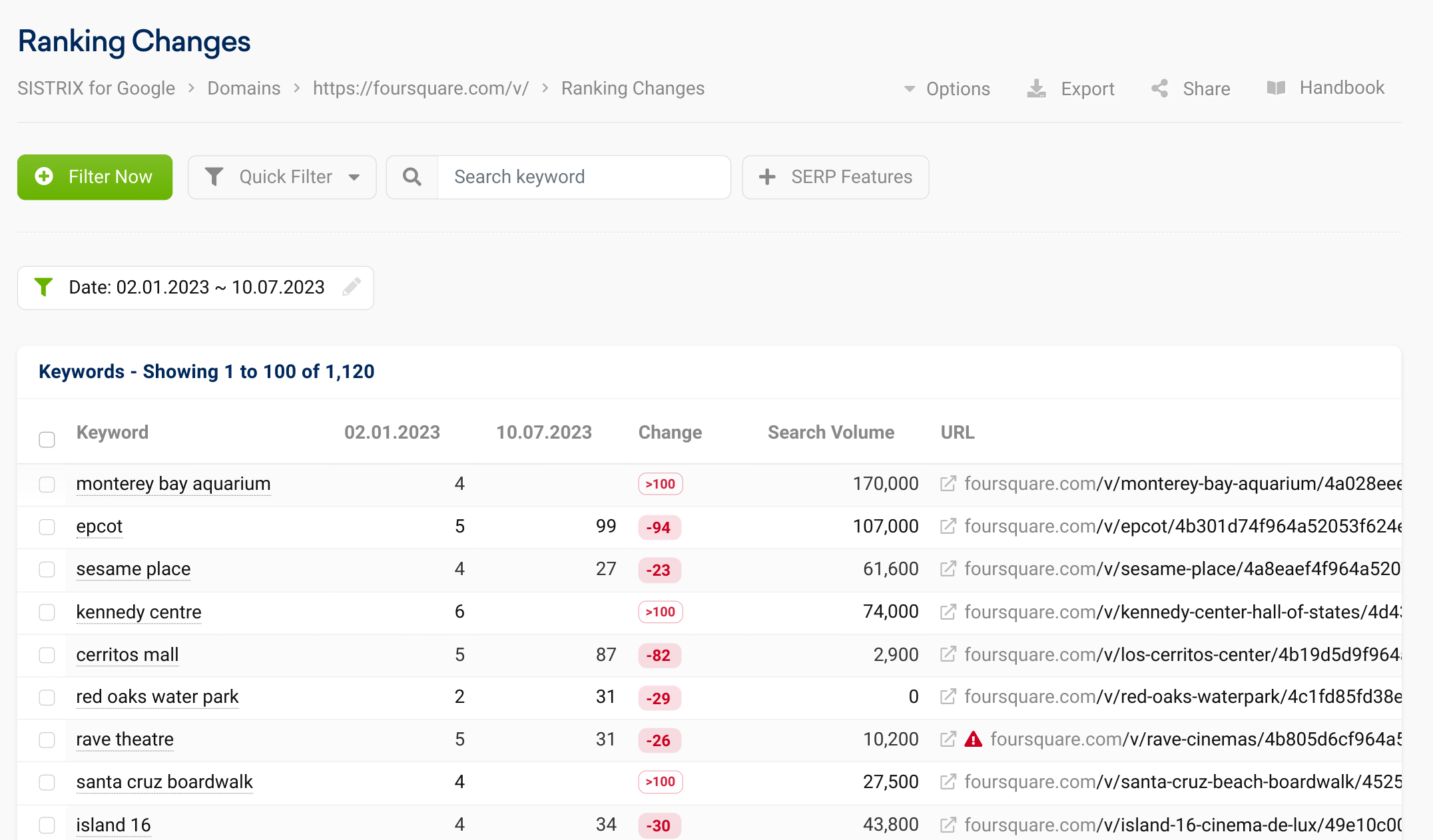
Let’s take a closer look at the Epcot search term. What changes took place in the SERPs since the beginning of they year.
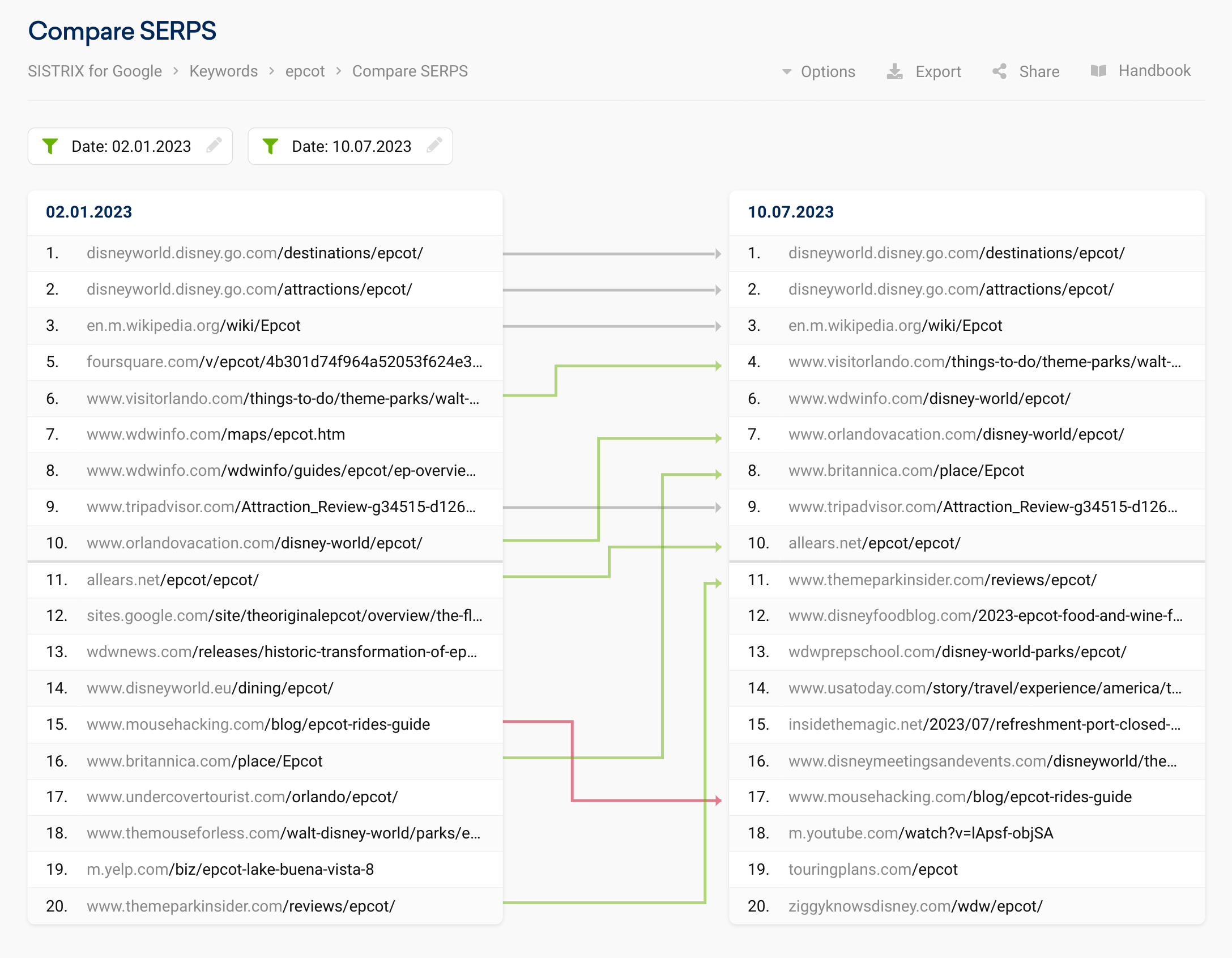
Foursquare lost to three very focused websites and a reference site. Tripadvisor, a different type of tourist attraction website, remained at position 9. Ignoring Wikipedia, there isn’t a UGC website in the top 10 now.
Did a similar thing happen at Yelp, the user-generated-reviews website?
It’s interesting to note that Twitter, too, dropped from the Top 10 but looking at a single SERP isn’t the best way to view large-scale changes. This process would need to be done a number of times to start to get any feel for a general change in SERPs-build.
Conclusion
Itâs important to remember that not all visibility losers have actually done anything wrong as far as SEO strategy or execution. In fact, many of these sites were subject to external factors, such as bankruptcy, changes in user behavior, or new guidelines and algorithm updates by Google.
Furthermore, algorithm updates often operate like a pendulum; just because a site saw a major swing in one direction does not mean that the pendulum wonât swing back during the next update. As Google continually refines its algorithms to best serve user intent (which is always changing and evolving), so too will SEO rankings and search visibility footprints continue to see volatility.
Read the winners report here.


